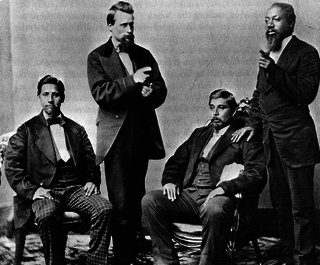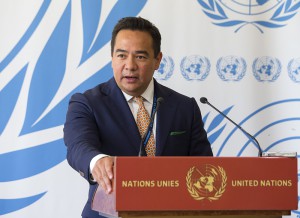An amicus curiae is someone who is not a party to a case who assists a court by offering information, expertise, or insight that has a bearing on the issues in the case. The decision on whether to consider an amicus brief lies within the discretion of the court. The phrase amicus curiae is legal Latin.

Tribal sovereignty in the United States is the concept of the inherent authority of indigenous tribes to govern themselves within the borders of the United States. Originally, the U.S. federal government recognized American Indian tribes as independent nations, and came to policy agreements with them via treaties. As the U.S. accelerated its westward expansion, internal political pressure grew for "Indian removal", but the pace of treaty-making grew nevertheless. Then the Civil War forged the U.S. into a more centralized and nationalistic country, fueling a "full bore assault on tribal culture and institutions", and pressure for Native Americans to assimilate. In the Indian Appropriations Act of 1871, without any input from Native Americans, Congress prohibited any future treaties. This move was steadfastly opposed by Native Americans. Currently, the U.S. recognizes tribal nations as "domestic dependent nations" and uses its own legal system to define the relationship between the federal, state, and tribal governments.

The Blackfeet Nation, officially named the Blackfeet Tribe of the Blackfeet Indian Reservation of Montana, is a federally recognized tribe of Siksikaitsitapi people with an Indian reservation in Montana. Tribal members primarily belong to the Piegan Blackfeet band of the larger Blackfoot Confederacy that spans Canada and the United States.

Blood quantum laws or Indian blood laws are laws in the United States and the former Thirteen colonies that define Native American status by fractions of Native American ancestry. These laws were enacted by the American government as a way to establish legally defined racial population groups; by contrast, many tribes and nations do not include blood quantum as part of their own enrollment criteria.

Cobell v. Salazar is a class-action lawsuit brought by Elouise Cobell (Blackfeet) and other Native American representatives in 1996 against two departments of the United States government: the Department of Interior and the Department of the Treasury for mismanagement of Indian trust funds. It was settled in 2009. The plaintiffs claim that the U.S. government has incorrectly accounted for the income from Indian trust assets, which are legally owned by the Department of the Interior, but held in trust for individual Native Americans. The case was filed in the United States District Court for the District of Columbia. The original complaint asserted no claims for mismanagement of the trust assets, since such claims could only properly be asserted in the United States Court of Federal Claims.

The Indian Child Welfare Act of 1978 (ICWA) is a United States federal law that governs jurisdiction over the removal of Native American (Indian) children from their families in custody, foster care and adoption cases.
Native American self-determination refers to the social movements, legislation, and beliefs by which the Native American tribes in the United States exercise self-governance and decision making on issues that affect their own people.
Elouise Pepion Cobell, also known as Yellow Bird Woman was a tribal elder and activist, banker, rancher, and lead plaintiff in the groundbreaking class-action suit Cobell v. Salazar (2009). This challenged the United States' mismanagement of trust funds belonging to more than 500,000 individual Native Americans. She pursued the suit from 1996, challenging the government to account for fees from resource leases.
Pan-Indianism is a philosophical and political approach promoting unity, and to some extent cultural homogenization, among different Native American, First Nations, Inuit and Métis (FNIM) groups in the Americas regardless of tribal distinctions and cultural differences.
The Supreme Court decision in Obergefell v. Hodges that legalized same-sex marriage in the states and most territories did not legalize same-sex marriage on Indian reservations. In the United States, Congress has legal authority over tribal reservations. Thus, unless Congress passes a law regarding same-sex marriage that is applicable to tribal governments, federally recognized American Indian tribes have the legal right to form their own marriage laws. As such, the individual laws of the various United States federally recognized Native American tribes may set limits on same-sex marriage under their jurisdictions.
Menominee Tribe v. United States, 391 U.S. 404 (1968), is a case in which the Supreme Court ruled that the Menominee Indian Tribe kept their historical hunting and fishing rights even after the federal government ceased to recognize the tribe. It was a landmark decision in Native American case law.
John E. EchoHawk is a Native American attorney and founder of the Native American Rights Fund, established in 1970. He is a leading member of the Native American self-determination movement.
Bryan v. Itasca County, 426 U.S. 373 (1976), was a case in which the Supreme Court of the United States held that a state did not have the right to assess a tax on the property of a Native American (Indian) living on tribal land absent a specific Congressional grant of authority to do so.
Merrion v. Jicarilla Apache Tribe, 455 U.S. 130 (1982), was a case in which the Supreme Court of the United States holding that an Indian tribe has the authority to impose taxes on non-Indians that are conducting business on the reservation as an inherent power under their tribal sovereignty.

The Native American Fish and Wildlife Society (NAFWS) is a non-profit organization and is a national tribal organization in the United States established informally during the early 1980s. NAFWS was incorporated in 1983 to develop a national communications network for the exchange of information and management techniques related to self-determined tribal fish and wildlife management.
Kerr-McGee v. Navajo Tribe, 471 U.S. 195 (1985), was a case in which the Supreme Court of the United States held that an Indian tribe is not required to obtain the approval of the Secretary of the Interior in order to impose taxes on non-tribal persons or entities doing business on a reservation.
Adoptive Couple v. Baby Girl, 570 U.S. 637 (2013), was a decision of the Supreme Court of the United States that held that several sections of the Indian Child Welfare Act (ICWA) do not apply to Native American biological fathers who are not custodians of a Native American child. The court held that the procedures required by the ICWA to end parental rights do not apply when the child has never lived with the father. Additionally, the requirement to make extra efforts to preserve the Native American family also does not apply, nor is the preferred placement of the child in another Native American family required when no other party has formally sought to adopt the child.

Keith Michael Harper is an American attorney and diplomat who was the first Native American to ever receive the rank of a U.S. ambassador. He is a member of the Cherokee Nation of Oklahoma and as a lawyer he is known for working on behalf of Native Americans. He was, from June 2014 to January 2017, the U.S. representative to the United Nations Human Rights Council in Geneva.
Arlinda Locklear is an American lawyer of Native American origin from the Lumbee tribe. Locklear was the first Native American woman to argue a case before the U.S. Supreme Court and is noted as an expert in Native American law and tribal recognition litigation. She represented the Lumbee tribe in its quest for federal recognition from 1987 until 2010.
Sharp v. Murphy, 591 U.S. ___ (2020), was a Supreme Court of the United States case of whether Congress disestablished the Muscogee (Creek) Nation reservation. After holding the case from the 2018 term, the case was decided on July 9, 2020, in a per curiam decision following McGirt v. Oklahoma that, for the purposes of the Major Crimes Act, the reservations were never disestablished and remain Native American country.






